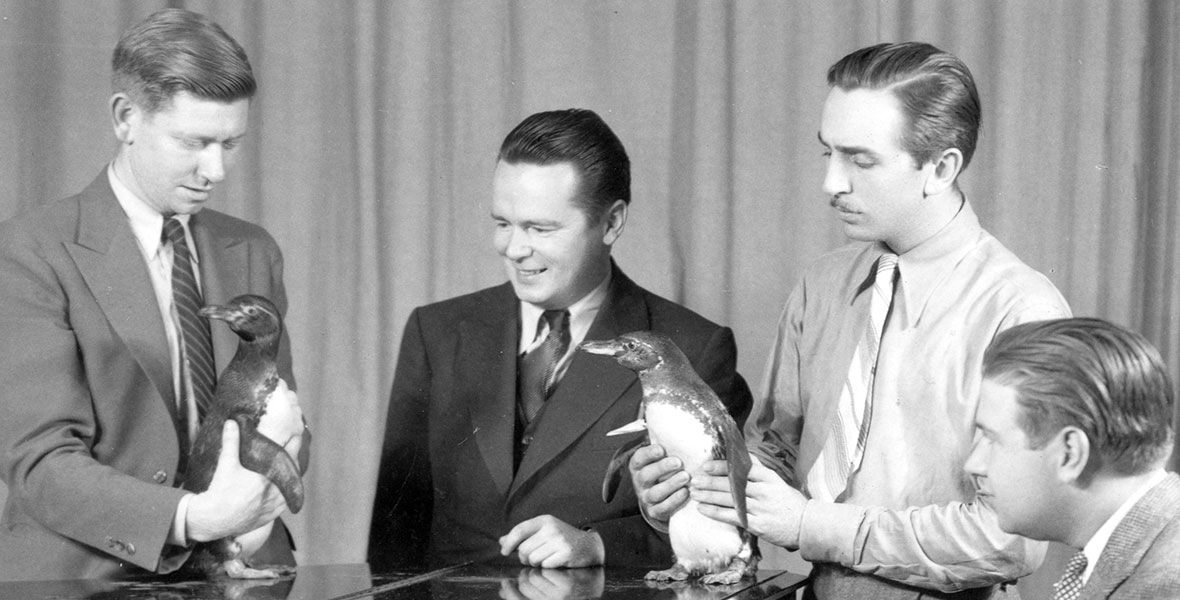(Pictured above far right, Leigh Harline)
Composer Leigh Harline graced Disney with a musical sophistication that was uniquely “Harline-esque,” by weaving rich tapestries of mood-setting underscores and penning memorable melodies for animated shorts and features. Among his creations were the beloved “When You Wish Upon a Star,” which debuted in 1940’s Pinocchio; it remains the signature song for The Walt Disney Company today.
As Disney producer and director Wilfred Jackson told writer Ross Care, “[Leigh’s songs] seemed like symphonic writing by a good classical composer.” He added, Leigh’s music “was melodic enough, but his counter melodies, his harmonic structure, all contributed so much more to the final effectiveness of his scores. Leigh could not have conveyed the full feeling of his scores with just two hands and a piano.”
Born in Salt Lake City, Utah, on March 26, 1907, Leigh was one of 13 children. He majored in music at the University of Utah and studied piano and organ with former director of the Mormon Tabernacle Choir J. Spencer Cornwall.
In 1928, he moved to California, working at radio stations in both San Francisco and Los Angeles as a composer, conductor, arranger, instrumentalist, singer, and announcer.
In 1931, he caught the ear of Walt Disney and the rest of the nation when he provided music for the first transcontinental radio broadcast to originate from the West Coast.
Leigh joined Disney in 1932, writing tunes for more than 50 animated shorts, including Silly Symphonies The Old Mill, Music Land, and The Pied Piper; the last of these was described by Care as a “cartoon cantata.” He added that Leigh’s contributions to animated shorts between 1935 and 1938 rank among “some of the finest, most inventive music ever created in Hollywood.”
Walt acknowledged Leigh’s skill by entrusting him with scoring the Studio’s first feature-length animated cartoon Snow White and the Seven Dwarfs, along with Disney Legend Frank Churchill. Leigh effectively underscored such dramatic moments as the Queen’s transformation into an apple-toting crone, as well as classic Disney songs including “Someday My Prince Will Come.” For this, he received his first Oscar® nomination for Best Music and Score.
In 1940, Pinocchio earned Leigh two Academy Awards® for Best Music and Original Score and for Best Song (“When You Wish Upon a Star”).
Leigh left Disney the next year to freelance at studios including Columbia, Paramount, and Goldwyn-RKO. During his career, which spanned nearly three decades and garnered eight Oscar nominations in all, Leigh composed and supervised music for motion pictures including The Pride of the Yankees starring Gary Cooper, Johnny Come Lately starring James Cagney, and George Pal’s The Wonderful World of the Brothers Grimm, all of which earned the composer additional Oscar nods.
By the early 1960s, Leigh expanded his craft into television, creating music for such popular series as Ben Casey starring Richard Chamberlain and Daniel Boone starring Disney Legend Fess Parker.
Leigh Harline passed away on December 10, 1969, in Long Beach, California.



